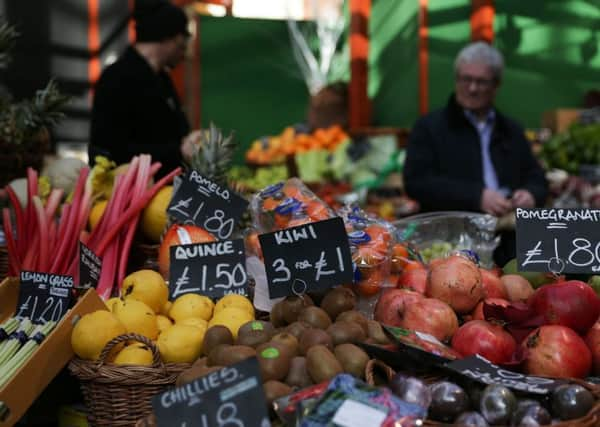Inflation hits highest levels since 2014 as fuel costs soar


The Office for National Statistics (ONS) said the Consumer Price Index (CPI) measure of inflation hit 1.8 per cent last month, up from 1.6 per cent in December, marking its highest level since June 2014.
However, it did not hit the Bank of England’s 2 per cent target and economists’ expectations of 1.9 per cent.
Advertisement
Hide AdAdvertisement
Hide AdSeparate figures for the Producer Price Index (PPI) showed that input prices – the amount paid for materials and fuel by UK manufacturers – saw its highest rate of growth since September 2008, rising 20.5 per cent in January.
Sterling’s drop against the US dollar and the euro since the European Union referendum result, coupled with rising oil prices, also caused import prices to leap 20.2 per cent over the period, the ONS said.
Ballooning import prices triggered by the Brexit-hit pound are expected to push up everyday prices as companies pass on their rising costs to consumers.
ONS head of inflation Mike Prestwood said the rise in CPI was triggered by rising petrol and diesel prices and a “significant slowdown in the fall in food prices”.
The pound was down 0.5 per cent against the US dollar at $1.246 and 0.6 per cent lower against the euro at €1.17 after inflation came in lower than forecast.
The Bank of England expects inflation to lift to its 2 per cent target in February, peaking at 2.8 per cent in the first half of next year, before falling back to 2.4 per cent in three years’ time. Kristin Forbes, one of the nine rate-setters on the Bank’s Monetary Policy Committee, signalled last week that she was inching closer to voting for a rate rise after becoming increasingly “uncomfortable” with surging inflation given the economy’s resilience to the Brexit vote.
The main driver behind the January’s jump in CPI came from transport prices, which dropped by less than the amount a year ago, falling by 0.6 per cent between December and January, against a 2.5 per cent drop the year before.
Fuel prices climbed 3.4 per cent over the period after dropping by 2.6 per cent a year earlier, as the resurgent cost of Brent crude fed its way through to prices at the pumps. The price of petrol rose to 118.6p per litre in January, up from 114.6p per litre the month before, while diesel reached 121.9p per litre last month, up from 118p per litre in December.
Advertisement
Hide AdAdvertisement
Hide AdOverall food prices were flat between December and January after falling 0.6 per cent a year ago, as the sharp drop in grocery costs, triggered in part by the supermarket price war, ground to a halt.
The ONS said a rise in the cost of imported foods caused by the Brexit-hit pound may have been a factor that caused the fall in food prices to slow.
Downward pressure on CPI came from a drop in the price of clothing and footwear, which edged down by 4.2 per cent between December and January against a smaller fall of 3.1 per cent the year before.
Andrew Sentance, senior economic adviser at PWC, said he expected UK economic growth to hit around 1.5 per cent for this year and next, despite rising inflation squeezing consumer spending.
He said: “The trend is clearly towards higher inflation, however, and we should expect the rate of price increases to rise above the 2 per cent Bank of England target in the next few months.
“By the end of this year, inflation is likely to be around 3 per cent.”